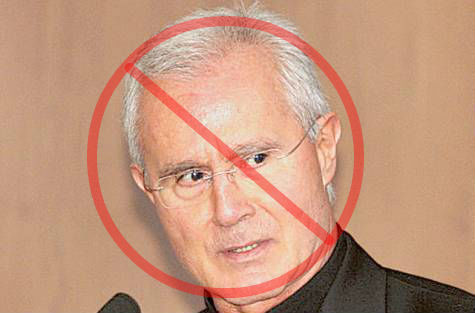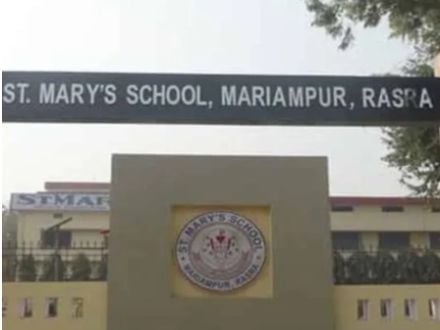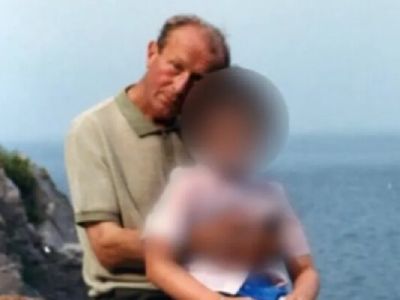Jyeshtha Krushnapaksha 11, Kaliyug Varsha 5115
Why the media, which always spits venom against so-called accusations of malpractices against Hindu ‘Dharma Gurus’, never publish about corrupt activities of Christian ‘Dharma gurus’ ?
 Monsignor Nunzio Scarano |
Vatican City: The plot involved an armed police escort, a wealthy shipping family and a plan to secretly transport $26 million (20 million euros) from a Swiss bank account into Italy aboard a private jet. At the heart of the story of greed: a silver-haired Vatican monsignor.
The latest corruption scandal to hit the Holy See unraveled in public on Friday as Monsignor Nunzio Scarano, a Vatican accountant, was arrested in the customs-dodging Swiss bank case. He is also under investigation in a separate case of alleged money-laundering involving his Vatican bank account.
The developments came two days after Pope Francis created a commission of inquiry into the Vatican bank to get to the bottom of the problems that have plagued it for decades and contributed to its reputation as an unregulated, offshore tax haven.
Francis has made it clear that he has no tolerance for corruption or for Vatican officials who use their jobs for personal ambition or gain. He has said he wants a "poor" church that ministers to those most in need. He has also noted, tongue in cheek, that "St. Peter didn't have a bank account."
With Francis' reform-minded hand now running the show, the Vatican said it was prepared to fully cooperate with Italian investigators, who described a remarkably detailed scheme allegedly spearheaded by Scarano to benefit some very wealthy friends. Prosecutor Nello Rossi identified them as the d'Amicos, one of Italy's most important shipping families from Scarano's hometown of Salerno in southern Italy.
Rossi declined to say if any of the d'Amicos were under investigation, but said developments were expected in the coming days.
Three people were arrested on Friday: Scarano, a onetime banker who was recently suspended from his job in the Vatican's main finance office, Italian financier Giovanni Carenzio and Giovanni Zito, who until recently was a member of the Italian military police's agency for security and information.
According to wiretapped conversations, the three allegedly plotted to smuggle in some 20 million euros in cash that Carenzio held in a Swiss bank account without declaring it to authorities at the airport.
Scarano's lawyer described him as something of a middleman: The 20 million euros belonged to the d'Amicos, who had given the money to Carenzio to invest but wanted it back. Scarano was tasked with persuading Carenzio to hand it over.
Rossi said the d'Amico money was presumably being held in Switzerland to avoid paying Italian taxes. An email seeking comment from the family's Rome-based company, the d'Amico Societa di Navigazione SpA, wasn't immediately returned.
According to prosecutors, Zito, the Carabinieri agent, called in sick to his job one day in July 2012, rented a private plane and flew with Carenzio to Locarno, Switzerland, to pick up the money. The plan was for Carenzio to withdraw the cash from his bank account and hand it over to Zito to bring back to Italy. The arrangements were so detailed there was even to be an armed police escort waiting at the airport to bring the money to Scarano's home in Rome, Rossi said.
"This operation was meticulously planned in all its details," the prosecutor said, noting that Zito was chosen to be the mule because his high-ranking position in the Italian police agency would have enabled him to pass through the airport customs area without being stopped.
The money could have been transported relatively easily because euros are issued in high denominations. If the cash had been withdrawn in the largest denomination — 500 euro notes — it would have weighed 97 pounds (44 kilos) and fit into a suitcase.
But at a certain point in Locarno, the deal fell through. Carenzio, who had been increasingly balking at handing the money over, made excuses that the Swiss bank couldn't come up with the money, Rossi said.
He declined to identify the bank and it's not clear where the money is. But this isn't the only investigation looking into Carenzio's financial dealings: Rossi noted news reports in the Canary Islands that authorities there are investigating Carenzio for alleged fraud, misappropriation of funds and concealment of assets. He is alleged to have operated a Ponzi scheme, the reports say.
After the aborted transport flight, Zito returned to Rome empty-handed. But he still demanded from Scarano his fee of 600,000 euros for the operation. Scarano cut him one check for 400,000 euros which he deposited. He gave him a second check for 200,000 euros, but in a bid to prevent the check from being deposited, reported it as missing, the prosecutor said.
That put a block on the check and resulted in Scarano being accused of slander for filing a false report knowing that the check was in Zito's hands, Rossi said.
Scarano, as well as the other two, are also accused of corruption. If they are indicted and convicted, they could face up to five to six years in prison, prosecutors said. Rossi said investigators were also looking into the source of Scarano's wealth and his real estate holdings.
Asked how his client responded to the accusations, Scarano's attorney, Silverio Sica, said the monsignor would respond to prosecutors' questions.
"As far as I know, Father Nunzio was only trying to help some friends and then entered a mechanism that later revealed to be dangerous for him too," he said in an interview. "I believe he did it with naivety".
The Vatican bank, known as the Institute for Religious Works, is cooperating with Italian authorities and its lay board has launched an internal investigation, spokesman Max Hohenberg said. The Vatican spokesman, the Rev. Federico Lombardi, said Scarano was suspended more than a month ago and that the Vatican was taking the appropriate measures to deal with his case.
He said the Vatican hadn't yet received any request for information from Italian authorities, but said it was prepared to offer its "full cooperation."
Rossi, the Italian prosecutor, described the operation as one branch in a "mosaic" of investigations targeting the Vatican bank, which has long been a source of scandal for the Holy See.
Rossi's team of prosecutors in 2010 placed the top two Vatican bank officials under investigation for allegedly violating anti-money laundering norms during a routine transaction involving an Institute for Religious Works account at an Italian bank. They ordered the 23 million euros in the transaction seized. The money was eventually unfrozen but the two men remain under investigation.
The Swiss investigation didn't immediately appear to directly involve the Vatican Bank, but both Rossi and Vatican officials said there could be further developments.
Rossi noted that the d'Amicos were frequent contributors to Scarano's charitable account at the Vatican Bank, known as the "Fondo Anziani," a fund purportedly aimed at helping out the elderly.
Rossi's team is also working with prosecutors in Salerno on a separate money-laundering investigation involving Scarano and his Vatican bank accounts.
According to Sica, Scarano took $729,000 (560,000 euros) in cash out of his Vatican bank account in 2009 and carried it out of the Vatican and into Italy to help pay off a mortgage on his Salerno home.
The money had come into Scarano's Vatican bank account from donors who gave it to the prelate thinking they were funding a home for the terminally ill in Salerno, Sica said.
To deposit the money into an Italian bank account — and to prevent family members from finding out he had such a large chunk of cash — he asked 56 close friends to accept 10,000 euros apiece in cash in exchange for a check or money transfer in the same amount. Scarano was then able to deposit the amounts in his Italian account.
The lawyer said Scarano had given the names of the donors to prosecutors and insisted the origin of the money was clean, that the transactions didn't constitute money-laundering, and that he only took the money "temporarily" for his personal use.
The home for the terminally ill was never built, though the property has been identified, Sica said.
On Wednesday, Francis named five people to head a commission of inquiry into the Vatican bank's activities and legal status "to allow for a better harmonization with the universal mission of the Apostolic See."
Source: Idaho Press-Tribune




